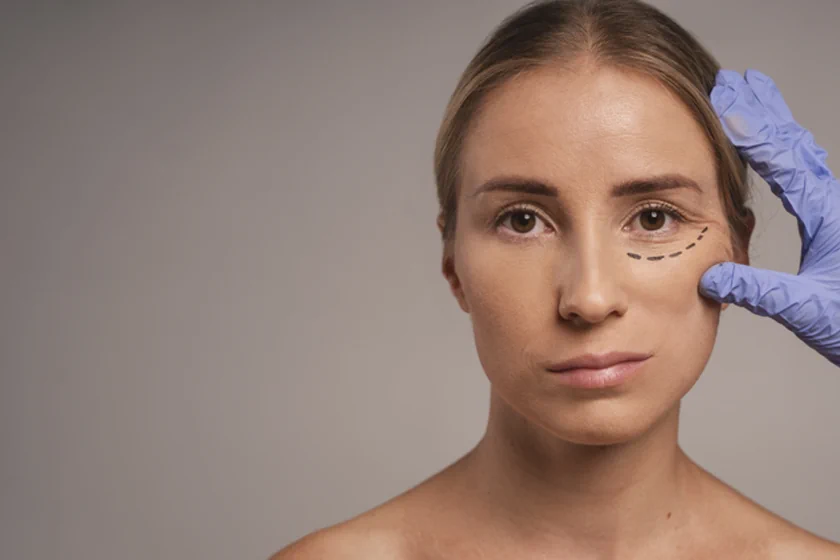|
Getting your Trinity Audio player ready...
|
In today’s fast-paced world, where screens glow late into the night and stress levels soar, our precious sleep often takes a backseat.
But did you know that sacrificing sleep not only leaves you groggy the next day but can also wreak havoc on your eyesight?
Yes, you read that right! The quality of your sleep directly impacts the health of your eyes, and neglecting it could lead to a host of vision-related issues.
Poor sleep habits can pave the way for these nightmares to become a reality. From increased risk of conditions like dry eye syndrome to exacerbating existing eye problems, inadequate sleep can cast a dark shadow over your visual world.
Let’s delve into the fascinating connection between sleep and eye health, and uncover why a good night’s rest is crucial for preserving your precious sight.
Relationship Between Eye Health and Sleep
The relationship between eye vision and sleep is intricate and vital for maintaining optimal visual health. Quality sleep is crucial for various aspects of eye function, including ocular surface health, visual acuity, and overall eye comfort.
Restorative Processes
The relationship between eye vision and sleep is intricate and vital for maintaining optimal visual health. Quality sleep is crucial for various aspects of eye function, including ocular surface health, visual acuity, and overall eye comfort.
Cellular Repair and Regeneration
Sleep allows for cellular repair and regeneration throughout the body, including the eyes. During sleep, damaged cells in the eyes have the opportunity to repair and regenerate, promoting overall eye health and function. This process helps to maintain the integrity of ocular tissues and supports optimal visual performance.
Intraocular Pressure Regulation
Adequate sleep plays a role in regulating intraocular pressure (IOP), which is the pressure inside the eye. Disruptions in sleep patterns, such as sleep deprivation or sleep disorders like sleep apnea, can lead to fluctuations in IOP. Elevated IOP is a risk factor for conditions like glaucoma, highlighting the importance of quality sleep in maintaining ocular health.
Visual Processing and Acuity
Sleep also influences various aspects of visual processing and acuity. Poor sleep quality or insufficient sleep can impair cognitive function, including visual processing and attention. This can result in decreased visual acuity, difficulty focusing, and slower reaction times, affecting overall visual performance and safety.
Blue Light Exposure
Exposure to blue light from screens and electronic devices can disrupt sleep patterns by suppressing the production of melatonin, a hormone that regulates sleep-wake cycles. Prolonged exposure to blue light before bedtime can interfere with the body’s natural circadian rhythm, leading to sleep disturbances and potentially impacting visual health over time.
How to Induce Better Sleep For Maintaining Eye Health?
Improving sleep quality is crucial for maintaining eye health. Here are some ways to induce better sleep for optimal eye health:
Establish a Consistent Sleep Schedule
During sleep, the body undergoes essential restorative processes that are critical for eye health. For example, tear production increases during certain stages of sleep, helping to lubricate and protect the ocular surface. This process is essential for preventing dry eye syndrome and maintaining eye comfort.
Create a Relaxing Bedtime Routine:
Develop a relaxing bedtime routine to signal to your body that it’s time to wind down. This may include activities such as reading, listening to calming music, or practicing relaxation techniques like deep breathing or meditation.
Limit Screen Time Before Bed
Reduce exposure to blue light from screens, such as smartphones, tablets, and computers, at least an hour before bedtime. Blue light can interfere with melatonin production and disrupt your sleep-wake cycle.
Optimize Your Sleep Environment
Make your bedroom conducive to sleep by keeping it cool, dark, and quiet. Invest in comfortable bedding, pillows, and a supportive mattress to enhance your sleep comfort.
Avoid Stimulants Before Bed
Minimize consumption of caffeine and alcohol in the hours leading up to bedtime, as these substances can interfere with sleep quality and disrupt your sleep cycle.
Limit Daytime Naps
While short daytime naps can be beneficial for some people, avoid long or late-afternoon naps that may interfere with your ability to fall asleep at night.
Exercise Regularly
Engage in regular physical activity during the day, as exercise can help promote deeper, more restorative sleep. Aim for at least 30 minutes of moderate exercise most days of the week.
While short daytime naps can be beneficial for some people, avoid long or late-afternoon naps that may interfere with your ability to fall asleep at night.
Manage Stress
Practice stress-reduction techniques, such as mindfulness meditation, progressive muscle relaxation, or yoga, to help calm your mind and prepare your body for sleep.
Watch Your Diet
Be mindful of your eating habits, particularly in the evening. Avoid heavy meals, spicy foods, and excessive fluid intake close to bedtime, as these can cause discomfort and disrupt sleep.
Seek Treatment for Sleep Disorders
If you suspect you have a sleep disorder, such as sleep apnea or insomnia, seek evaluation and treatment from a healthcare professional, like Dr. Surbhi Kapadia, a leading ophthalmologist in Vadodara. Addressing underlying sleep issues can improve both sleep quality and eye health.
Conclusion
In conclusion, prioritizing quality sleep is paramount for improving eye health and overall well-being. Adequate sleep supports vital processes like tear production, tissue repair, and intraocular pressure regulation, all of which contribute to optimal ocular function.
Remember, better sleep leads to healthier eyes and sharper vision. If you have concerns about your eye health or sleep patterns, don’t hesitate to consult Dr. Surbhi Kapadia for expert guidance and personalized care.
With her expertise in general eye care and dedication to patient well-being, Dr. Kapadia can help you achieve and maintain optimal eye health for years to come.
FAQs About the Link Between Sleep and Eye Health
How many hours of sleep do I need to maintain healthy eyes?
For maintaining healthy eyes, adults typically need 7-9 hours of sleep per night. Consistent, quality sleep allows for essential processes like tear production, tissue repair, and intraocular pressure regulation, which are vital for ocular health. Adequate sleep also supports overall well-being, including visual function and comfort.
Can blue light from screens affect my sleep and eye health?
Yes, prolonged exposure to blue light from screens can disrupt sleep patterns and contribute to digital eye strain. Consider using blue light filters or limiting screen time before bed.
What are some natural remedies for improving sleep quality and eye comfort?
Natural remedies for better sleep and eye comfort include practicing relaxation techniques, creating a comfortable sleep environment, and incorporating foods rich in sleep-promoting nutrients like magnesium and melatonin into your diet.
Is it normal to experience eye twitching or irritation after a night of poor sleep?
Yes, eye twitching and irritation can be common symptoms of sleep deprivation. Getting adequate rest and practicing good sleep habits can help alleviate these symptoms.
What role does nutrition play in promoting good sleep and eye health?
A balanced diet rich in vitamins, minerals, and antioxidants is essential for supporting both sleep quality and eye health. Foods like leafy greens, fatty fish, and nuts contain nutrients that benefit both systems.
![]()







